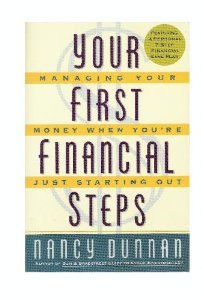Your First Financial Steps/Managing Your Money When You’re Just Starting Out, by Nancy Dunnan is funny.
I graduated from college in 1995, the same year Your First Financial Steps came out, so in a sense I am precisely the demographic who was supposed to buy this book, at that time. I knew nothing about the topic of finance as a college senior, and I still recall the conversation in which a family member explained to me the difference between a stock and a bond, and the difference between the terms “fixed income” and “equity.[1]”
I’m interested now, in 2013, because I’m attempting to write a book for exactly the same purpose, for college graduates in 2014 and 2015.
Good advice on personal finance doesn’t change much from year to year, or decade to decade, and some financial writing from 1875 and 1949 still holds up well.[2]
But this book did not age well and ends up being kind of funny.
It’s not wrong, exactly, it’s just a time capsule of the way things were when I graduated from college. Nobody would dream of buying, or reading, a personal finance book like this now.
A few choice features that made me chuckle.
1. Dunnan frequently recommends readers photocopy pages of formatted tables from her book. The reader can then use this newly photocopied page to fill in a set of information such as the anticipated costs of personal life goals or accumulated debts. Something tells me nobody is going to photocopy tables from a book these days. Not to mention the more important fact that if you’re writing down numbers that need summation or manipulation in some way, and that’s not in a spreadsheet, you’re doing it wrong.
2. All of the useful sources of government or commercial information she references – from the IRS to credit bureaus to low-cost campgrounds for affordable vacations – come with an address and telephone number. No websites, obviously, since in 1995 the World Wide Web was only on the verge of launch. My God how did we know anything back then?
3. Some of the advice seems to come from an earlier Norman Rockwell age, before the Federal Reserve was identified as the Star Chamber of the Trilateral Commission, controlling everything from global equity prices to ushering in a New World Order of black helicopters and United Nations control. In 1995, however, a college student like me might have seen the Fed as another aspect – along with George Bailey’s Bailey Building and Loan Association – of the local banking scene. In the chapter on banking, Dunnan lists the cities with regional Federal Reserve banks and advises the just starting-out student: “Call the one nearest you to find out about a tour.” I don’t know why that made me laugh. Does she want her readers to be disappeared forever?[3]
4. On getting a job, on page 63, Dunnan includes a special box entitled “Looking for a Job by Computer.” This edgy piece of advice includes the name of a software program called “Jobhunt” that lists “the names, addresses, and info on 600+ employers, arranged by job type and geographic region.” Send away for that program on diskette and start your job hunt today!
Anyway, in sum, I’m enjoying the “literature review” of personal finance books – so I thought I’d share some of my pleasure with Bankers-Anonymous readers. Please send me a telegram (or whatever) if you recommend a book on personal finance I should read or review in the course of my research.
Amazon link to: Your First Financial Steps/Managing Your Money When You’re Just Starting Out
Please see related post: All Bankers Anonymous Book Reviews in one place.
[1] If you don’t know the difference, we’re both in luck! I have a book you need to read. Just give me about a year to get an agent, a publisher, and get this thing on the shelves. You’re going to love it.
[2] On 1875 finance, I recommend Anthony Trollope’s The Way We Live Now, which I plan to review some time. It’s so good, and all about Bernie Madoff, before Bernie Madoff’s grandfather was even born. For the key book on investing from 1949 I’m referring of course to Benjamin Graham’s The Intelligent Investor.
[3] I kid, I kid. It’s a joke.
Post read (10406) times.






3 Replies to “Book Review: Your First Financial Steps – Managing Your Money When You’re Just Starting Out”
El Codigo del Dinero by Raimon Samso. (The Money Code). I still can’t find an English translation.
Cheesy title, but his breakdown of types of income was eye opening, in particular how to generate passive income, and how to tell the difference between a ‘cost’ and ‘investment.’
Thanks for creating your blog
Que tan fortuito que leo bien el Espanol. Gracias!
Orale! (-: Espero que sea una buena inversion de su tiempo.